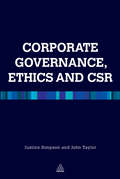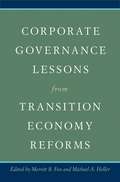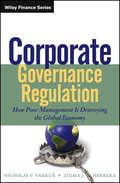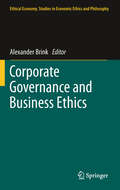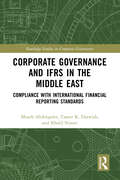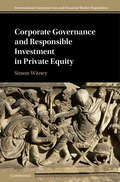- Table View
- List View
Corporate Governance Codes for the 21st Century: International Perspectives and Critical Analyses
by Jean J. du Plessis Chee Keong LowThe book is the first comprehensive consideration, since the UK Cadbury Report recommended a voluntary Corporate Governance Code, of the question whether Corporate Governance Codes are the most effective way of ensuring adherence to good corporate governance principles. There is no doubt that the idea of voluntary compliance with good corporate governance practices, based on the principle of 'comply or explain', has captured the imagination of the world. It is probably one of the best and most comprehensive examples of 'self-regulation' ever seen in any area where the society could be affected significantly, for current purposes by corporations. However, is this the most effective way of ensuring that corporations act responsibly and adhere to good corporate governance principles? Have these Codes really improved corporate governance practices significantly? Is it time for a rethink and, at least in certain areas, start to rely more on 'hard law' and clearer expectations to ensure compliance? All these issues are addressed in the book.
Corporate Governance Ethics and CSR
by John R Taylor Justine SimpsonCorporate Governance, Ethics and Corporate Social Responsibility brings together the three separate strands relevant to the new demands of organizational behaviour and reporting. Taking a holistic approach to the issue of the role of the organization in society, the responsibilities within which it operates, obligations to its stakeholders (including its employees and their dependents) and the ethical underpinning which has to be in place for any form of honest reporting, the authors look not only at the organization as a reporting entity complying with a set of rules or nebulous concepts but as a functioning part of the business environment. Offering a wealth of real-life examples and case studies, the author demonstrate the realities of balancing socially responsible business with modern business practice in a diverse range of organizations, including both the private and public sector.
Corporate Governance Lessons from Transition Economy Reforms
by Merritt B. Fox & Michael A. HellerCorporate Governance Lessons from Transition Economy Reforms explores a timely topic at the intersection of economics, law, and policy reform. To date, most sophisticated theoretical work on corporate governance has focused on advanced market economies. In post-socialist countries, corporate finance and transition economics scholars have often done little more than convey the received theory to transition policymakers. This volume focuses, for the first time, on the reverse concern: what, if anything, do the reform experiences of transition countries teach about corporate governance theory more generally? To investigate this question, Merritt Fox and Michael Heller have assembled a stellar group of corporate governance theorists. The answers are startling. The principal essays approach the problem from three complementary perspectives that form the organizing themes of the book. The first part refines core corporate theory terms. The second presents important empirical work that explores the channels through which "good corporate governance" may link to the real economy. The final part links corporate governance theory to practical reforms. After fifteen years of experience, practice can now inform theory. Together, these essays present a comprehensive new view on a provocative theme. Written in an accessible style, they will be of interest to a broad range of scholars, commentators, and policymakers.
Corporate Governance Matters: A Closer Look at Organizational Choices and Their Consequences
by David Larcker Brian TayanFully updated for the latest research, trends, and regulations, the Third Edition of this book offers comprehensive and objective information for everyone seeking to improve corporate governance--from directors to institutional investors to policymakers and researchers. To help you design highly effective governance, the authors thoroughly examine current options, reviewing what is and isn't known about their impact on organizational performance. Throughout, they take a strictly empirical and non-ideological approach that reflects rigorous statistical and research analysis and real-life examples. They address issues ranging from board structure, processes, operations, and functional responsibilities to institutional investors, outside stakeholders, and alternative forms of governance.
Corporate Governance Mechanisms and Firm Performance: Lessons from India (India Studies in Business and Economics)
by Shveta Singh Monika SinglaThis book begins by analysing the various corporate governance mechanisms explored in the extant literature and determining their effectiveness in enhancing the firm value using multivariate analysis. The findings are of global relevance as the corporate governance regulations of most countries focus on independent directors as the mainstay of good governance. The empirical evidence from the first objective of this study corroborates the claim that independent directors do not strengthen the firms’ governance quality. The book is one of the few works to have analysed the possible reasons behind the ineffectiveness of the independent directors. Also, in view of the famous concept of the bundle of governance mechanisms, it might be possible that the independent directors strengthen the firms’ governance quality indirectly by strengthening other governance mechanisms. This aspect too has little precedence. This study adopts a novel moderation and mediation approach to analyse the monitoring behaviour of independent directors in relation to other governance mechanisms. The work is a must read for corporate players as well as researchers and scholars studying this discipline.
Corporate Governance Models: A Critical Assessment (Routledge Focus on Business and Management)
by Marco MastrodascioThe activities carried out in a business organization stem from the contribution of subjects who cooperate in the expectation of obtaining adequate rewards. The ability of organizations to reach a specific level of performance is influenced by the ownership structure, while the management is directed and controlled through a set of rules and incentives. This set regulates the distribution of rights and responsibilities among the board, company management and stakeholders, and it defines the corporate governance model adopted by the organization. The collapse of global organizations across the world have undoubtedly revealed the inherent flaws in the contemporary corporate governance practices. As a result of these international scandals, a great deal of multidisciplinary research has been growing restlessly to define the specificities of each corporate governance model, however, lacking a specific investigation into the presumed existence of the most suitable one. By favouring the synthesis and the inductive procedure, this book analyses the potential existence of the most appropriate corporate governance model based on comparative international analysis of cultural, social and economic factors influencing the organization’s choice regarding the corporate governance model to be adopted. This volume will be of interest to researchers, academics, professionals, and students in the fields of corporate governance, international business, and law.
Corporate Governance Practices in India
by Priyanka Kaushik SharmaCorporate Governance Practices in India examines corporate governance practice in Indian industry. This book critically analyses the governance practice and evaluates the needs of corporate governance in the two major industries in India: Auto Industry and Heavy Engineering Industry. The study explores the state of compliance of the key governance parameter in both the industries in line with the mandatory and non-mandatory requirements stipulated by the Revised Clause 49 of (SEBI) ListingAgreement as also the provisions required by the Companies Act, 1956. The book aims to study the concept of corporate governance and check the level of compliance of corporate governance codes in Auto Industry and Heavy Engineering Industry in India, and draw comparisons in the adoption of corporate governance practices by Auto Industry vis-#65533;-vis Heavy Engineering Industry.
Corporate Governance Reforms in the EU: Do They Matter and How?
by Iryna Ivaschenko Petya Koeva BrooksA report from the International Monetary Fund.
Corporate Governance Regulation
by Nicholas V. Vakkur Zulma J. HerreraWhy U.S. corporate governance regulation has lost its way, and what must be done to improve itModern history persuasively demonstrates the inexorable link that binds comprehensive regulation to the global economy. This important book, rather than simply recount a litany of corporate governance failures, persuasively explains why, despite policymakers' best intentions, regulation has failed in the modern era. An objective study intended for a diverse readership, Corporate Governance Regulation unveils the underlying, root causes of regulatory failure. The result: A compelling and original analysis, broadly suited for a global audience of all backgrounds.Written by published, subject-area experts, the authors carefully delineate how U.S. corporate governance regulation, beginning with Sarbanes Oxley, lacks an adequate rational basis, as may be attributed to a non-existent policy dialogueThe witnessed result: A conspicuous lack of regulatory efficacy, enormous costs, coupled with paltry benefitsThe focus is upon reigniting a stalled, non-productive policy dialogue, by eschewing stale, overly-polemicized arguments, as needed to develop a common groundDrawing from an eclectic, analytic framework, governance experts Nicholas Vakkur and Zulma Herrera offer both the professional and global citizen alike a multi-dimensional understanding of issues critical to global economic health. Nuanced and persuasively argued, Corporate Governance Regulation represents a formidable catalyst in the elusive, ongoing quest for global economic stability.
Corporate Governance and Accountability of Financial Institutions: The Power and Illusion of Quality Corporate Disclosure (Palgrave Studies in Accounting and Finance Practice)
by Jonas Abraham AkuffoThe presence of sound corporate governance in a financial institution is important in maintaining the confidence of both the market and the public. The power that corporate governance holds over the success of some of the largest financial institutions in the world is not to be downplayed. This book methodically assesses the quality of corporate governance and mechanisms of accountability disclosures to various stakeholders. It is further intended to provide fresh insights into some specific corporate governance recommendations to help improve good governance in financial institutions, particularly in the United Kingdom and the EU but will also be applicable to other major economies. It explores what, when and how corporate governance has changed the financial institution functions and corporate executive behaviour by critically reviewing the pre- and post-financial crisis theoretical and empirical literature. Increasingly driven by the nature of complications, complexities and opacity in the operations of financial systems, corporate governance reporting plays an important role in the financial sector. It will provide insights into corporate governance disclosures over a long-term basis. This book should be a valuable asset to support the research of practitioners, students and all academics due to its stimulating and reflective insights into this fascinating topic.
Corporate Governance and Business Ethics (Ethical Economy #39)
by Alexander BrinkThis volume explores corporate governance from three perspectives: a traditional economic, a philosophical, and an integrated business ethics perspective. Corporate governance has enjoyed a long tradition in the English-speaking world of management sciences. Following its traditional understanding it is defined as leadership and control of a firm with the aim of securing the long-term survival and viability of that firm. But recent business scandals and financial crises continue to provide ample cause for concern and have all fuelled interest in the ethical aspects. As a result, corporate governance has been criticized by many social groups. Economic sciences have failed to provide a clear definition of the corporate governance concept. Complexity increases if we embed the economic approach of corporate governance in a philosophical context. This book seeks to define the concept by examining its economic, philosophical and business ethics foundations.
Corporate Governance and Contingency Theory: A Structural Equation Modeling Approach and Accounting Risk Implications (Contributions to Management Science)
by Abdul Ghofar Sardar M. N. IslamThis book analyzes the determinants and effectiveness of corporate governance in an integrated model drawing on contingency theory and employing structural equation modeling (SEM). Business competition as an environmental factor and strategy as an organizational factor are important determinants of corporate governance, while organizational performance and earnings quality are two dimensions of its effectiveness. This book focuses on the relationship between corporate governance and earnings management, and shows that corporate governance is effective in improving earnings quality and reducing accounting and governance risks. The authors also question the relation between corporate governance and company performance and present results of their analysis in this book.
Corporate Governance and Corporate Behavior in Japan: The Consequences of Stock Options and Corporate Diversification (SpringerBriefs in Economics #0)
by Masaharu HanazakiThis book carefully examines the effects of changes in the corporate governance structure on corporate behavior or company performance, using micro-data from listed companies in Japan. The author found that in Japan the introduction of stock options had neither a positive impact on profitability nor the negative side effects of promoting risk-taking behaviors. Furthermore, he found that corporate diversification and division of corporations showed negative impacts on profitability. The corporate governance structure of Japan has exhibited a large change from the second half of the 1990s to the present. There have been institutional reforms involving enterprise law, such as the introduction of stock options and the removal of the ban on holding companies. With respect to the ownership structure of a company, discernible trends are that the equity holdings of financial institutions and business corporations have fallen while the presence of foreign stockholders has risen. These trends are often pointed out as signs that the Japanese corporate governance structure has been approaching the American model and that this will energize Japanese firms. The author contradicts common academic theories, however, and concludes that the formation of the corporate governance which emphasizes the agency problem between shareholders and corporate managers is inadequate. He suggests that an institutional arrangement for a corporate governance system that values a variety of stakeholders' interests is greatly needed and concludes that perspectives on maximizing surplus values for various stakeholders and distributing the surpluses appropriately among the stakeholders will become increasingly important for the purpose of managing corporations.
Corporate Governance and Corporate Social Responsibility of Indian Companies (CSR, Sustainability, Ethics & Governance)
by Saumitra N. Bhaduri Ekta SelarkaThe book explores the theoretical and empirical issues relating to the interaction between corporate governance and corporate social responsibility (CSR) activities undertaken by Indian companies. It presents a highly detailed view on the evolution of CSR and its nexus with corporate governance. This is particularly timely in the context of the recent Indian Companies Act 2013, which mandates corporate social responsibility and revises the best corporate-governance practices for large companies. The findings of this study are unique in drawing from a unified framework of Indian corporate governance structure and corporate engagement in CSR. The book's scope is both academic and practical; the research methodology developed and utilized is useful for researchers, while the implications and the selection of variables provide useful information for practitioners and stakeholders. Finally, although it focuses on large Indian companies, the findings can also be applied to research on other emerging economies.
Corporate Governance and Economic Development: Identifying Critical Institutional Reforms
by Anna LanoszkaThis book explores the links between different corporate governance systems and their impact on economic development. It focuses on how institutional reforms, legislative changes and codified measures have influenced performance at the firm and country level. Drawing on detailed cases from the UK, USA, China, India, Poland, Brazil, Russia and South Africa, this book takes a truly international and comparative approach to understanding the relationship between regulatory frameworks and economic development. This will be a valuable text for students and researchers of economic development, corporate governance, international political economy, and economic and business history.
Corporate Governance and Finance Law
by Roy GirasaCorporate Governance and Finance Law is designed to educate students, researchers, and practitioners on the legal aspects of corporate financial markets within the United States, the Eurozone, and China.
Corporate Governance and IFRS in the Middle East: Compliance with International Financial Reporting Standards (Routledge Studies in Corporate Governance)
by Tamer K. Darwish Muath Abdelqader Khalil NimerThe rapid globalization of capital markets has increased attention toward examining the quality of the disclosure practices implemented by companies, as internationalization and globalization are the most important motives of the harmonization of financial statements preparation and presentation. Given the expansion of trade and the openness to foreign capital markets, investment decisions became not limited only for local users, but also international users may need to access the financial information. The issuance of International Financial Reporting Standards (IFRS) to be used throughout the world aims to improve the comparability and understandability of financial statements, and hence, to enhance investment decisions through helping investors across the borders to invest in multinational companies. Although fluid and under-developed institutional arrangements remain central features of emerging markets, ensuring effective corporate governance mechanisms would indeed support companies in complying with IFRS – the latter imposes a challenge for companies operating in emerging markets. This book evaluates the differences in the level of compliance with IFRS across the GCC states, exploring the impact of corporate governance on the level of compliance with IFRS and presenting an empirical analysis of companies across the GCC. It makes an important contribution by providing a detailed empirical analysis of the interplay between corporate governance and IFRS in emerging market setting and highlights the way for future research. It will provide international business, management, and accounting and finance students and senior practitioners with a completely new and updated guide to the work in the field of corporate governance and IFRS compliance in emerging markets.
Corporate Governance and Organisational Performance: The Impact of Board Structure
by Naeem Tabassum Satwinder SinghEstablishing a corporate governance strategy that promotes the efficient use of organisational resources is instrumental in the economic growth of a country, as well as the successful management of firms. This book reviews existing literature and identifies board structural features as key variables of an effective corporate governance system, establishing a multi-theoretical model that links Board structural characteristics with firm performance. It then, using a comprehensive empirical study of 265 companies listed on the Karachi Stock exchange, tests this conceptual model. This research serves as a significant milestone, reflecting the socio-economic setting of emerging economies, and highlighting the need for the corporate sector in emerging markets to move away from a 'tick-box' culture. It argues that the sector needs to implement corporate governance as a tool to mitigate business risks; appoint and empower non-executive directors to achieve an effective monitoring of management; and establish their own ethical and governance principles, applicable to the Board of Directors.Based on an extensive data base, collected painstakingly over five years, this book offers new insights and conceptual framework for further research in this area. Given the breadth and width of the research, it is a useful source of future reference for students, researchers and policy makers.
Corporate Governance and Responsible Investment in Private Equity (International Corporate Law and Financial Market Regulation)
by Simon WitneyPrivate equity-backed companies are ubiquitous and economically significant. Consequently, the corporate governance of these companies matters to all of us, and – not surprisingly – is coming under increasing scrutiny. Simon Witney, a practicing private equity lawyer, positions private equity portfolio companies within existing academic theory and examines the laws that apply to them in the UK. He analyses the actual governance frameworks that are put in place and identifies problems created by the legal rules – as well as the market's solutions to them. This book not only explains why these governance mechanisms are established, but also what they are expected to achieve. Witney suggests that private equity owners have both the incentives and the capability to focus on responsible investment practices. Good governance, he argues, is a critical success factor for the private equity industry.
Corporate Governance and Risk Management in Financial Institutions: An International Comparison Between Brazil and Germany (Contributions To Management Science)
by Robert C. GerickeThis book presents an overview of corporate governance and risk management, analyzing their interdependence and particularly their relevance in banking. It discusses current trends in corporate governance, such as stakeholder management, financial performance and the cost of equity, compensation schemes, board structures and shareholder activism. Further, it reviews some of the most important regulatory changes introduced since the latest financial crisis and highlights their impact on the annual reports of the banks under analysis. Lastly, the book assesses and compares major banks in Brazil and Germany with special emphasis on the aspects mentioned above, revealing surprising similarities between the banking systems of these otherwise disparate countries.
Corporate Governance and Statutory Derivative Actions: Comparative Approach to Shareholder Litigation (Routledge Research in Corporate Law)
by Lang ThaiThis book is the first comprehensive study of the statutory derivative action in Australia, using the Australian model as a reference point and comparing it with the UK, Canada, Singapore, New Zealand, Hong Kong and USA counterparts. The book includes an empirical study covering over a twenty-year period from the date the statutory framework came into operation, coupled with extensive case law analysis and comparisons with other jurisdictions. It informs the world about the uniqueness of Australia’s statutory derivative action, and what other countries can learn from it as shareholder protection and promotion of good corporate governance. While some countries have statutory derivative action, there are still countries that do not have the statutory framework that are considering introducing it into their corporate law. This book provides insights and suggestions for lawmakers, litigation practitioners and researchers worldwide in reforming their existing model.
Corporate Governance and Sustainability: Navigating Malaysia's Business Landscape
by Norazlan Alias Mohd Hasimi YaacobThis book presents a comprehensive exploration of contemporary issues in corporate governance and sustainability within the Malaysian context. Authored by experienced scholars and practitioners, each chapter delves into critical aspects shaping the landscape of business ethics, digital transformation, and societal responsibility. Beginning with an examination of role of digital transformation in driving sustainable innovation for Micro, Small, and Medium-Sized Enterprises (MSMEs), the volume goes on to explore the transformative potential and challenges of digital technologies on governance, sustainability, and taxation. It further highlights the significance of environmental, social, and governance (ESG) factors in measuring the sustainability and societal impact of businesses. Through insightful discussions on directorial responsibilities, social enterprises, stakeholder involvement in fraud prevention, and effective tax governance, this book offers valuable insights for practitioners, researchers, and students of business and accounting. By addressing key issues such as risk management, internal control, and tax compliance, this book serves as a timely resource for navigating the complexities of corporate governance and sustainability in Malaysia's dynamic business environment.
Corporate Governance and Sustainability: The Role of the Board of Directors
by Marco MinciulloThis book discusses the implementation of sustainability in corporate governance mechanisms since 2013 and assesses how much the role of the Board of Directors has changed as a result. The study explores the impact of legislation upon corporate governance in two European contexts, the UK and Italy, which have been affected differently by changes in national regulations since 2013. This investigation relies first on the analysis of interviews administered to the boards of directors of Italian firms, to highlight how far sustainability objectives were considered a real priority for their firms and how their role evolved in terms of specific duties and practices. Second, thanks to a rich dataset from 2013 to 2017, the investigation considers the corporate governance reports of top Italian and British listed firms, to identify how the integration of sustainability within corporate governance has been evolving since 2013, and how it has been disclosed. This insider perspective provides the reader with a set of tools useful for analysing firms’ engagement towards sustainability, and for assessing whether listed firms practice what they preach.
Corporate Governance and Sustainable Value Creation Models: Lessons from Germany, the United Kingdom, South Africa, India, Botswana, and Sri Lanka (CSR, Sustainability, Ethics & Governance)
by Shantha Indrajith LiyanageThe contemporary issue of the Anglo-American corporate vale model is short-termism. That is, the model operates in the interest of shareholders overlooking or at a cost of non-shareholder stakeholders’ interests including society and environment. The eye opening evidence is the 2008-09 global financial crisis. In these circumstances, this book examines how three Anglo-American corporate governance jurisdictions, the United Kingdom, South Africa, and India have recently modified their corporate value models for creating long-term sustainable value. The examination continues with the Anglo American corporate value models of two emerging countries also. Finally, the Continental European corporate (German) model is also analyzed. The comparative analysis is useful for revisiting not only the Anglo-Saxon Models in common law countries but also Continental European Models in civil law countries. This book is appropriate for scholars, academics, students, and policy makers who are interested in corporate governance models around the world.
Corporate Governance and Value Creation in Japan: Prescriptions For Boosting Roe
by Ryohei YanagiThis is the first book to furnish a root cause of the low valuation of Japanese listed companies by using, as qualitative evidence, unique global investor surveys, which are rarely available for Japanese companies. Also contained in this book as quantitative evidence is empirical research with regression analysis implying a positive correlation between corporate governance and value creation in Japan.The author explains the rationale underlying the suggestion of the Ito Review on return on equity (ROE) 8% guidance, an almost 50% discounted valuation of the cash held by Japanese companies, corporate value and ROE, equity spread as a key performance indicator for value creation, an optimal dividend policy based on optimal capital structure, risk-adjusted hurdle rates for value-creative investment criteria, and the synchronization of environmental, social, and governance with equity spread.Illustrated with relevant statistics, evidence of shareholders’ voices, case studies, and empirical research, the book is highly recommended for readers who seek qualitative and quantitative evidence of Japan’s problems and potential prescriptions in connection with value creation. “This book empirically proves the relationship between non-financial capitals defined by IIRC and corporate value, and provides a convincing method to unlock corporate value in Japan via Abenomics corporate governance reforms. A must read!”Richard S. Howitt, Chief Executive Officer, International Integrated Reporting Council (IIRC) “This book addresses emerging issues such as the "Power of Intangibles" in addition to IMA-defined "Equity Spread" as a gauge for value creation from the viewpoint of management accounting. It is highly recommended for finance and accounting professionals.”Jeffrey C. Thomson, CMA, CAE. President and CEO, Institute of Management Accountants (IMA)

